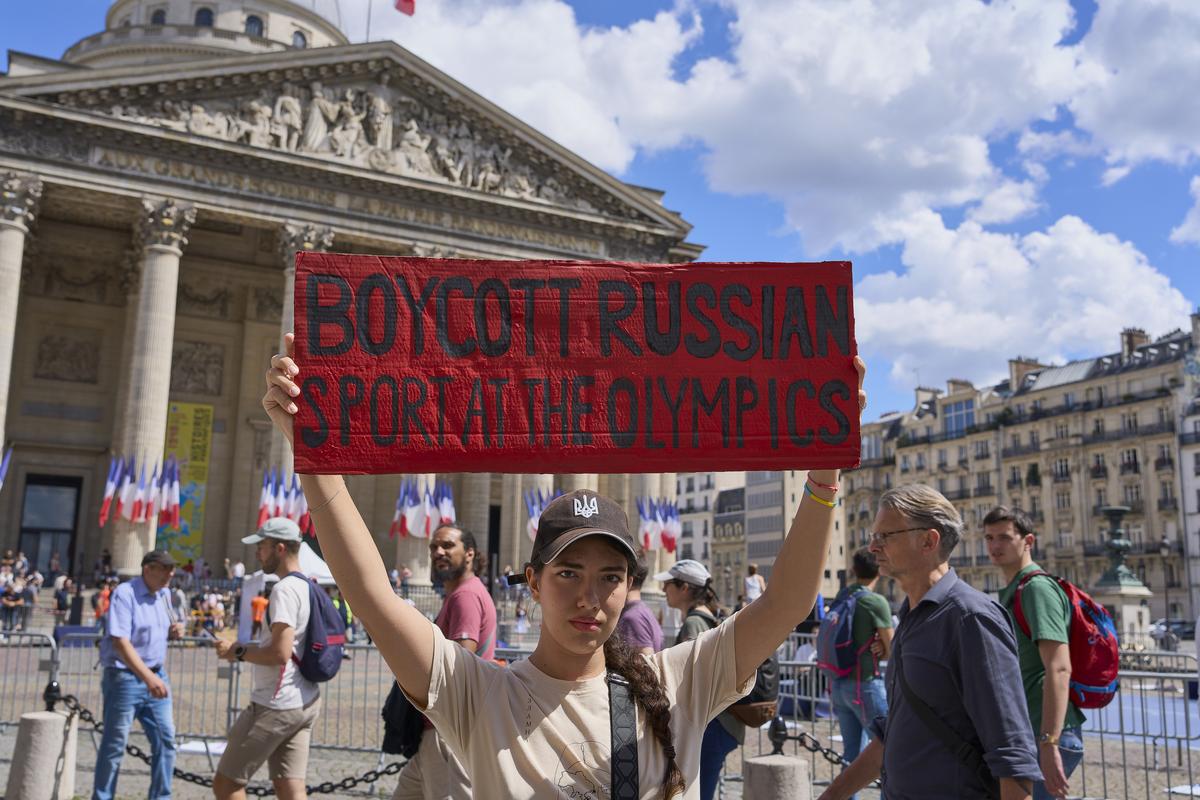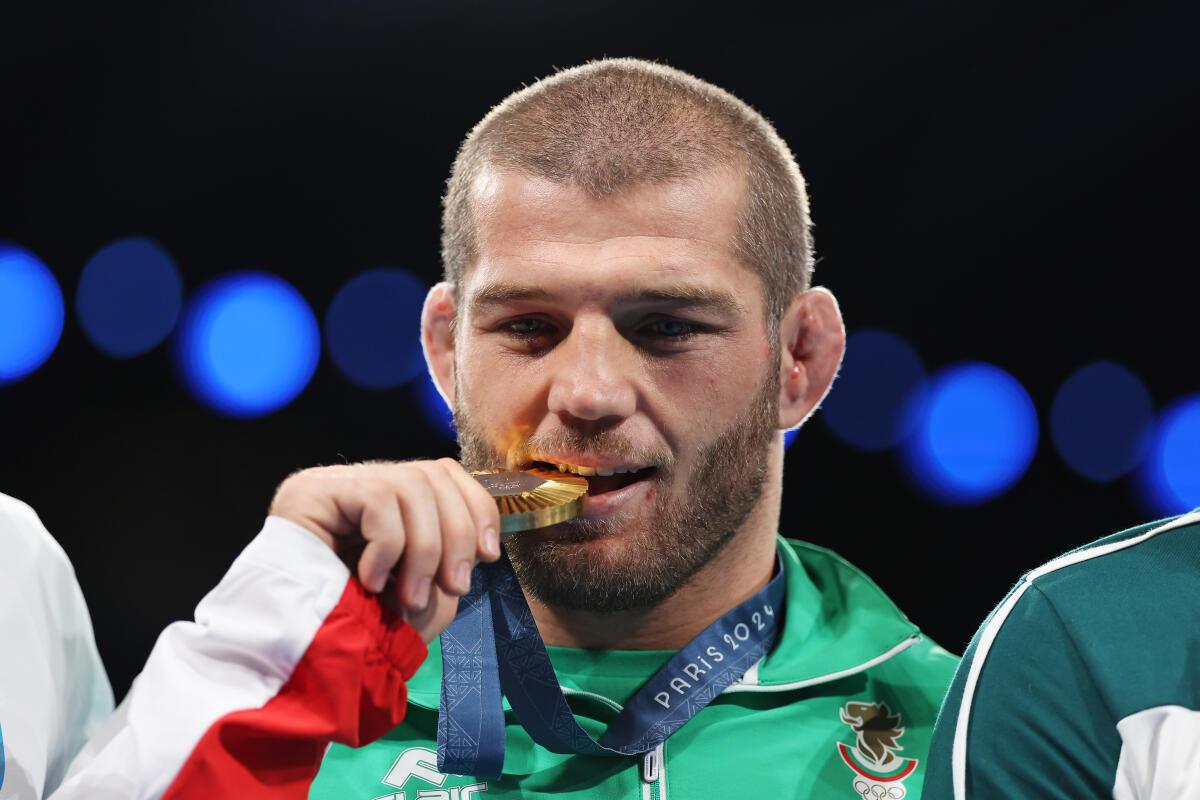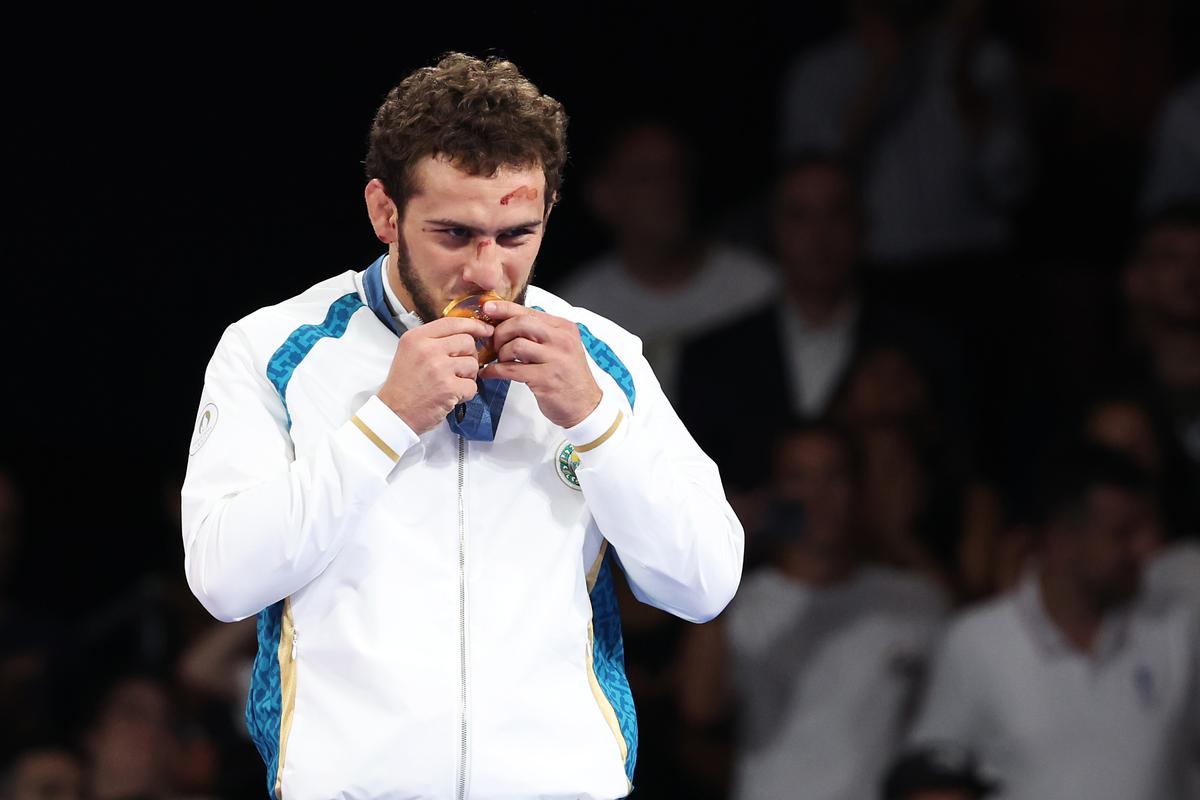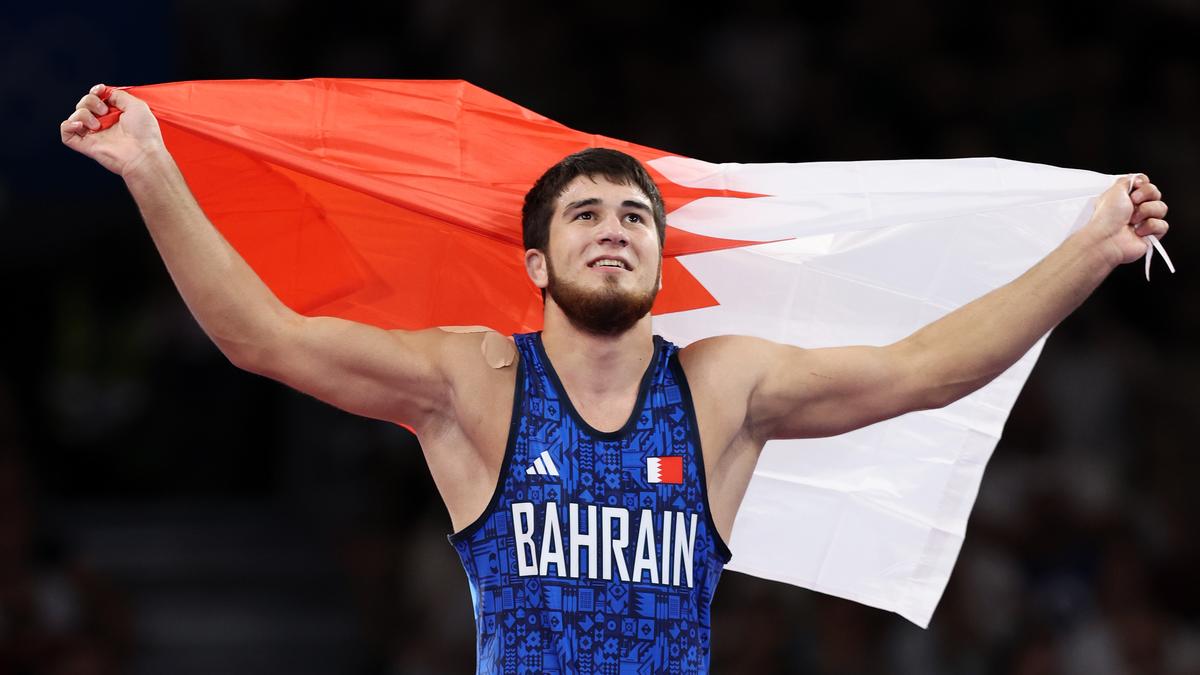On the last day of the Olympics at the Champ de Mars arena, it took Akhmed Tazhudinov less than two minutes to pin Givi Matcharashvili of Georgia and win gold in the men’s 97kg freestyle category – one of the marquee events of the international wrestling calendar.
Tazhudinov’s gold medal secured the 21-year-old’s reputation as one of the titans of the sport. He’s already the reigning world champion and the Asian Games champion. At the Olympics, he beat two-time U-23 World Champion Amir Ali Azarpira of Iran, former Olympic champion and three-time world champion Kyle Snyder and then finally two-time world medallist Matcharashvili.
Officially, he had made history. As the referee lifted up Tazhudinov’s hefty arm, the stadium commentator announced that the gold he had won was Bahrain’s first-ever Olympic medal in wrestling. In the crowd, a small Bahraini contingent cheered loudly. Tazhudinov hugged his coach and took a lap of the wrestling mat with the Bahraini flag draped around his shoulders.
But while the medal table will register a gold against Bahrain, Tazhudinov’s identity as a subject of the middle-eastern monarchy is not even skin-deep. At the post medal ceremony press conference, the room realised Tazhudinov doesn’t speak Arabic but Russian. He is from the town of Gergebil high up in the moutains in the Russian republic of Dagestan. The coach who he hugged after winning gold— Shamil Omaraov—has been coaching him for over a decade now at the Abdulrashid Sadulaev wrestling club in Dagestan.
Russia isn’t officially present at the 2024 Olympics. Sportspersons from the country have been told to compete as ‘Allied Independent athletes’ rather than under their country’s flag. Athletes who were found to have supported the 2022 Russian invasion of Ukraine were denied the right to compete at all. Russia’s two-time Olympic wrestling champion in the men’s 97kg freestyle Abdulrashid Sadulaev — after whom the club Tazhudinov trains at is named — was prevented from defending his title and banned from the Olympic qualifiers for the 2024 Paris Games for the same reason.

A woman holds a sign with the text “Boycott Russian sport at the Olympics” during a march in memory of the hundreds of Ukrainian athletes killed since the Russian invasion of the Ukraine on July 13, 2024 in Paris, France.
| Photo Credit:
Getty Images
A woman holds a sign with the text “Boycott Russian sport at the Olympics” during a march in memory of the hundreds of Ukrainian athletes killed since the Russian invasion of the Ukraine on July 13, 2024 in Paris, France.
| Photo Credit:
Getty Images
The regulations have chafed and the Russia’s wrestling contingent ended up pulling out of the competition altogether. This was considered a major blow to the competitiveness of the men’s freestyle wrestling competition. At the Tokyo Games for instance, Russian wrestlers won medals in five of the six weight classes including three gold medals. At the Rio Games, they medalled in three out of six weight categories including two gold medals while at London the medalled in four out of seven weight categories, winning two gold medals.
ALSO READ | Andreeva and Shnaider win first Olympic medal for Russians as neutrals
But despite Russia’s exclusion from the 2024 Games, there has been no shortage of Russians on the podium. Tazhudinov is not the only one. Wrestlers – who have come through the Russian wrestling developmental system and not just by origin – have won seven medals at the Paris Olympics including three gold medals out of the six men’s freestyle weight categories.
From Russia, with love
These include Tazhudinov representing Bahrain, Razambek Zhamalov representing Uzbekistan who stunned the field in the men’s 74kg category and Magomed Ramazanov —now representing Bulgaria — who upset former Olympic champion Hassan Yazdani of Iran in the 86kg final. Another four—Islam Dudaev (Albania 65kg category), Chermen Valiev (Albania 74kg category), Dauren Kurugliev (Greece 86kg category) and Magomedkhan Magomedov (Azerbeijan 97kg category) have won bronze.
The results were watched closely back home in Russia. A few minutes after Tazhudinov won gold, Abdulrashid Sadulaev posted a congratulatory note on Instagram.
“Congratulations to Akhmed Tazhudinov and our coach Shamil Omarov on a bright and confident victory at the Olympics in Paris! You have already written your name in history, Akhmed. Keep up the good work, it’s just the beginning! We are not at the Olympics, but, as they say, our business lives and wins. Akhmed Tazhudinov’s gold was the third for the graduates of the Russian wrestling school in Paris out of six possible. This is a strong result!,” Sadulaev posted in Russian.
It’s a result that speaks of the depth of talent in Russian wrestling. All these wrestlers might have learned their craft in Russia but switched nationalities over the past couple of years.
“Russia couldn’t send its main team because of politics. These wrestlers would have been part of our B or C teams,” says Vyacheslav Abdusalamov, one of the most followed wrestling journalists from Russia, currently covering the Paris Olympics.
This claim is backed by reality. Tazhudinov, for example, lost in the semifinals of the men’s 97kg category at the 2022 Russian National Championships before deciding to switch nationalities to Bahrain later that season. He’d never competed internationally for Russia even at an age-group competition.
ALSO READ | Russian wrestlers reject Olympics invitation
Even after his Olympic title, Tazhudinov continued to insist he was the junior to Sadulaev.
“It’s hard to believe I am the champion. Abdulrashid (Sadulaev) will always be our leader,” says Tazhudinov who despite wrestling for Bahrain, continues to live and train alongside Sadulaev and under Omerov in Dagestan.
While Tazhudinov didn’t get a chance to represent Russia, most of the wrestlers originally from Russia but competing for other countries made the move following the War in Ukraine when opportunities dried up for Russian athletes to compete overseas.
For some wrestlers the switch happened even later. Zhamalov only competed his transfer to Uzbekistan at the start of 2024. He competed in just two international tournament – the United World Wrestling (UWW) ranking series in Hungary before representing his adopted nation at the Olympics.
For most, the reason for switching nationalities is simple.
“The competition to represent Russia at the Olympics is very fierce,” says Abdusalamov.
“Unless you are the best in Russia, you will never get the chance to compete internationally. Most of the wrestlers who shift do so because they know this is their best chance to compete at the Olympics,” he says.

Magomed Ramazanov, who never won anything better than a bronze at the Russian national championships, admitted as much.
“I think Bulgaria is my second home. Bulgaria gave me the opportunity to compete at the Olympics. I was waiting for the opportunity to compete at the Olympics and time would fly as I waited. When I finally got my passport, I was very grateful,” he said, after beating the three-time world champion Yazdani in the final of the men’s 86kg category.
For others, the relentlessness of the Russian wrestling system was too much. A former U-23 World gold medallist for Russia, Razambek Zhamalov was out of competition for nearly two years with a series of injuries before moving to a country with a weaker domestic set up – which would do less damage to his body.
“I’ve had six to seven surgeries throughout my career. About two years ago I thought I would finish my career. I remember when I was in the operation theatre, I was thinking if I could continue. I will soon undergo another surgery on my shoulder,” Zhamalov said at a press conference following his gold medal win in the men’s 74kg category.
Still others are lured by economic factors.
ALSO READ | Ukraine’s Zhan Beleniuk retires after winning bronze in Greco-Roman wrestling
“If you are the silver or bronze medal winner in Russian national championships, no one cares that much about you. But if you go to another country, it’s a lot easier to make money. They will give you stipends and rewards for winning competitions for them,” he says.
Not everyone is a fan of Russian wrestlers swapping nationalities and still managing to dominate world wrestling. UWW president Nenad Lalovic is one of them.
“The old system and the rules will be much stricter regarding nationality change. We want, from now (on), for nations to develop their sport from the grass-roots level – to work on their own citizens more than they did in the past. Countries will be limited to having fewer ex-foreign citizens becoming their citizens. The new rules are very similar to those of the IOC, within a very narrow window of two athletes per year – one male and female. That will limit nationality changes a lot. Between now and the next Olympic Games, teams will not be able to be composed of foreigners, but must be a majority of that country’s nationality,” Lalovic said.
For now, though, Russia’s wrestlers continued to dominate at the Olympics. For Russians, it didn’t matter which flag was actually being raised at the medal ceremony.

Gold medalist Razambek Salambekovich Zhamalov of Team Uzbekistan
| Photo Credit:
Getty Images
Gold medalist Razambek Salambekovich Zhamalov of Team Uzbekistan
| Photo Credit:
Getty Images
“At the end of the day we know that these wrestlers are ours. After they win an Olympic medal, they all come back home where they are given gifts and rewards by big private businessmen in Dagestan and Moscow. It doesn’t matter which country they are representing. We know they are ours,” says Abdusalamov.
This is true for Tazhudinov as well. When he is asked what he’d do now that he’d won the Olympic title, he seemed confused at first.
“First I will go back to Bahrain and celebrate the win there. And then after that I’ll give my gold medal to my parents (in Gergebil). I want to keep it there,” he says.


